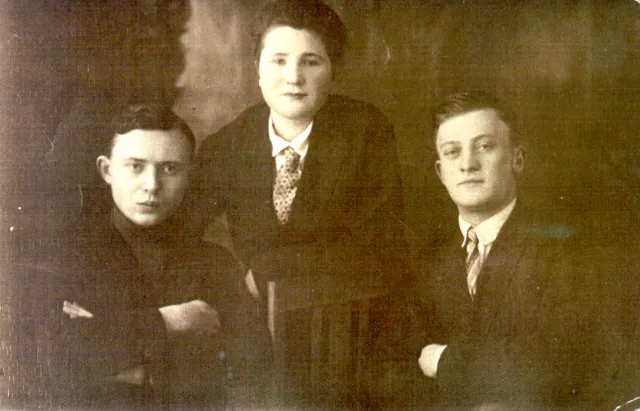My brother Roman Gliena, first on the right, a popular actor, and his colleagues, actors of the theater for young spectators (I don't remember their names). Kharkov, 1934.
My older brother Osher became the dearest person in my life. He was the nicest and most handsome man and had a beautiful voice. My brother studied at a grammar school in Kharkov. However, after the revolution of 1917 this grammar school was dismissed and my brother followed into my father's steps. My brother was a hardworking person and everything he took up worked out very well. Osher became fond of theater and attended a drama club in a cultural center. He was very talented and got to play the leading roles in Ukrainian plays and performances about the Civil War. Performances were in Russian or Ukranian. There was a theater near our house. My mother and brother were both theatergoers. My mother told me that there were actors living in the neighborhood and they often invited my mother to their performances. She used to take my brother to the theater with her. Some playwrights and screenwriters noted my brother's gifts and sent him to study at the studio in the Russian Drama Theater in Kharkov. He started work in touring groups, or drama clubs in kolkhozes until he got a job at the theater for young spectators in Kharkov before the Great Patriotic War. When working in the theater my brother changed his name to Roman. It doesn't mean that he was ashamed of his Jewish name, but it was better for his career to have a Russian name working in a Russian theater. At home my brother switched to Yiddish. Our father taught my brother to read in Yiddish. We had Talmud books at home and my father and brother read them. I remember that at Pesach they recited prayers. I was small and fell asleep early. They woke me up at midnight when it was time for seder. I don't remember celebration of other religious holidays at home. My parents went to synagogue 2-3 times a year, but they didn't take me with them. We had Russian classics at home: Pushkin, Lermontov and many others and I read a lot when I went to school and learned to read.
My brother became one of the leading actors in the theater for young spectators and played leading roles. They staged plays about heroes of the Civil War, denunciation of enemies of the Soviet power. Their performances developed patriotic feelings and hatred toward enemies in children. We often went to the theater. The art director of the theater valued my brother high. He received a small room in a communal apartment near the theater. My brother married an actress. Her name was Claudia and she was Russian. My father and mother were not very happy about his marriage, but not because she was not a Jew - this was a matter of no importance at the time - , but because they thought Claudia was a frivolous and flippant person. Osher was very independent. He respected our parents, but he relied on his own opinions. Well, he should have listened to his parents. He divorced his wife few years later. They didn't have children. He had lovers afterward, but he never remarried.











